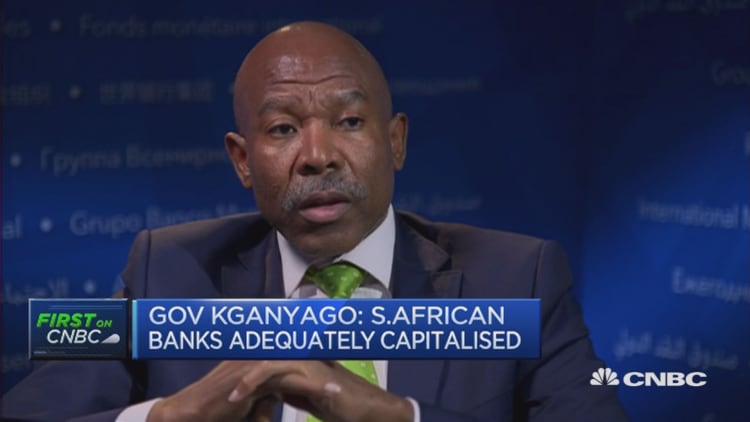
Moody's credit ratings agency has warned that it could downgrade South Africa's credit rating to junk in its November review, but the country's central bank governor has told CNBC that it's financial system could withstand such a move.
"We think that we have been addressing the concerns that the ratings agencies have raised," South African Reserve Bank Governor, Lesetja Kganyago, said. "And with the Ministry of Finance we've been working hard to avoid such a situation (a downgrade) occurring."
Last month Moody's said the likelihood of a downgrade for South Africa was around a third. "We would likely downgrade the rating in the absence of a growth recovery that we are anticipating," Moody's analyst Kristin Lindow told a conference in Johannesburg, Reuters reported.
But speaking to CNBC on the side-lines of the International Monetary Fund and World Bank meeting in Washington, Kganyago said that while he was not "relaxed" about the prospect of a potential downgrade, stress testing of South African banks earlier in the year had shown them to be resilient to such a scenario.
"I would not say I'm relaxed – there is no room for complacency. But what we're saying is that should (a downgrade) happen, we have resilient institutions that are able to deal with that. South African banks have been subjected to a stress test of a very adverse scenario should a downgrade actually take place and they were found to be able to weather that storm," he said.
Kganyago added that banks were stress tested on additional scenarios including Brexit, the collapse of the euro and a recession in South Africa etc, and passed.
"They were found to be resilient and part of the reason is that South African banks are actually holding more capital than they are required to hold," he said.
There are no plans to impose capital controls in the eventuality of a downgrade to junk status, according to Kganyago. "Let's jog our memory back – South Africa was once sub-investment grade and during that time we didn't have to impose capital controls…and we are not going back in the opposite direction," he said.
Despite Kganyago's confidence in the country's financial system, a potential downgrade by a major ratings agency would be a blow for South Africa at an already tricky time for both its economy and political sphere.
At present, Fitch Ratings and S&P Global Ratings rate South Africa at BBB-, one notch above sub-investment grade. Meanwhile, Moody's has South Africa's sovereign rating at BAA2 (a moderate credit risk), two notches above sub-investment grade.
Fears that South Africa's debt could be downgraded to sub-investment — or "junk" — grade by one of the big-three credit ratings agencies by the end of the year are not new.
Fitch's Head of Middle East and Africa Sovereigns Jan Friederich said recently that the ruling ANC party was in "panic mode" after suffering its worst local electoral results in August since the end of Apartheid, the system of racial segregation that ended in the country in the early 1990s.
Speaking at a Fitch conference, Friederich warned that this panic could spur "clearly populist measures" like the proposed national minimum wage, which if set too high could cause long-term problems with economic growth.



